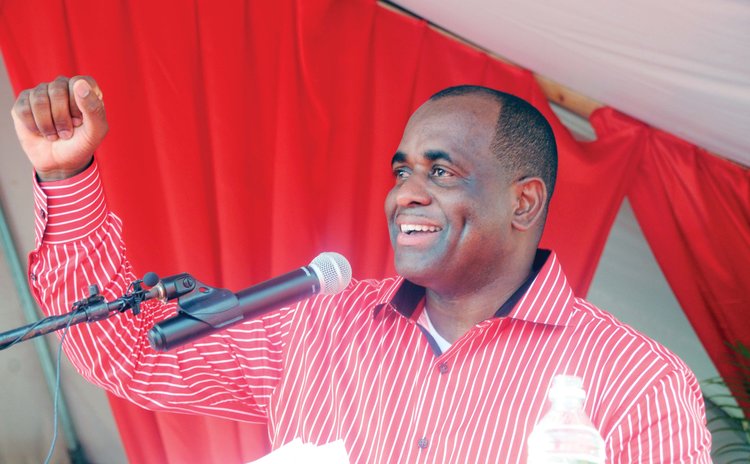Most opaque government ever

Tell Severin McKenzie of prime minister, Roosevelt Skerrit's claims of running a transparent government, and he laughs. A mischievously sarcastic, dismissive sort of laugh.
He then searches for words.
"For me this is the most intrans. . ."
The right words seem reluctant to come.
"This is, this is the most opaque government that I've ever come across in all the years," McKenzie finally utters.
As an architect, McKenzie has often wondered why contracts are being awarded without going out to tender, why government projects such as the housing programme and the construction of the Marigot hospital are being undertaken without anyone knowing the cost and why an international airport is being constructed, "and there is absolutely no information on some basic requirements" like environmental impact or the geological surveys, or the design.
"That's just words," he says of the prime minister's declaration.
Say the same thing to Matt Peltier and there's no hesitation, no searching for words. The response comes as if right on cue.
The prime minister often boasts of running a transparent government as the stock reply to questions about his administration's actions.
"This is the most transparent government you can find anywhere in the Western Hemisphere," he responded on one of his recent "Annou Palè radio and television programmes when asked by a reporter about freedom of information legislation.
He's made similar assertions before, including during his 2020/21 budget speech when he described his administration as "a prudent government which prides itself on transparency."
However, Skerrit's words ring hollow at best, according to various people who have been observing his actions and that of his ministers and senior public servants, as well as an examination of his behaviour regarding the sharing of information with the public.
Even as he spoke of transparency during the budget address, the prime minister failed to mention the highly controversial citizenship by investment (CBI) programme which involves the sale of nationality to rich foreigners.
A year earlier, in his response to Skerrit's 2019/20 budget presentation, the opposition leader, Lennox Linton, had pointed out a glaring EC$1.2 billion discrepancy between the amount of revenue the prime minister had claimed the country earned from the sale of passports, and the amount it ought to have earned.
The government has yet to satisfactorily explain what happened to the $1.2 billion, and Skerrit simply ignored the CBI in his last presentation. In addition, despite the fact that several crooks and criminals end up with Dominican diplomatic passports, the prime minister and his government have repeatedly refused to divulge the names or the number of people who have been given these passports, or the circumstances and terms and conditions under which they were given.
"All you have to do is to quote what Francine Baron said when she was foreign minister," Crispin Gregoire, a former Dominican diplomat, told The Sun in reference to the diplomatic passport issue.
Baron was the foreign minister in 2016 when Linton requested the names of every non-parliamentarian issued with diplomatic passports or given diplomatic status during the Labour party's reign beginning in July 2000, as well as those whose diplomatic passports had been withdrawn prior to expiration and the reasons.
Even though the prime minister had earlier said his government was "the most transparent in the Caribbean," Baron's response was that the administration was opposed to divulging such information to the public.
"I mean, what is he hiding?" asked Gregoire of the prime minister's refusal to provide information on the diplomatic passports.
They're hiding a lot more than the country realises, according to Nicholas George, a spokesman for the opposition United Workers Party (UWP). With the exception of its open and brazen "stealing of elections", the Skerrit government has been keeping secrets from parliament and the people of Dominica about everything, such as revenue from passport sales, its housing programme and how it's mixed up with Montreal Management Consultants, including details surrounding his official resident and the contract to build the international airport, contends George.
"It appears to me that the parliament of Dominica has become obsolete, the public service ineffective, and . . . the whole business of having accountability and transparency in government is just a joke," the UWP official told The Sun.
This lack of transparency, particularly in the area on planning and strategy, is costing the Dominican taxpayer millions in lost investments, argues Athie Martin, a development planning expert.
"I believe there has been zero transparency on policy, which means that the business investment climate of the country has remained in a state of limbo for the last 12 or 14 years," charges Martin. "That is at the bottom of the explanation for the departure of major investors, and for the absence of new investment in the economy."
Telling the story about lost investments, government programmes and policies, or any of the issues raised here is difficult for the media because it is virtually impossible to get any information from the government, including state entities and senior public servants.
While the prime minister holds new conferences – the last one was over a month ago – he avoids questions on subjects with which he's uncomfortable. There's been no word from him on one of the most riveting and troubling stories, that of the Indian diamond dealer, Mehul Choksi, and the circumstances surrounding Choksi's arrival and arrest in Dominica.
Outside of the cabinet briefings, access to Skerrit is limited to those with close connection with the ruling party, charges Matt Peltier, an experienced journalist and talk show host, and former head of the Media Workers Association of Dominica.
"This is my most difficult [it has been] as a journalist operating in Dominica. Since this regime has been in power, getting access to government minister is a very, very, very difficult thing," Peltier told The Sun. "It's not easy at all; it's not at all. And to [say] he is the most transparent, this is the biggest (misrepresentation) ever by any government."




